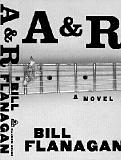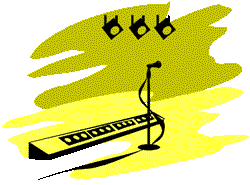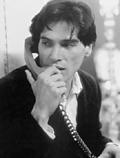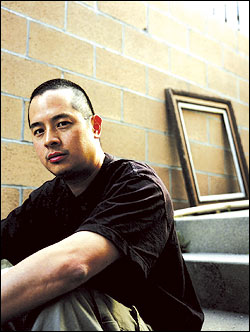UNDERSTANDING THE BROAD appeal of VH1’s Behind the Music is easy enough. After all, nearly every episode has roughly the same arc: Struggling nobody gets big fast, loses soul and/or mind to drugs and booze and sex and bad business deals, then comes back to earth after—in this order—losing initial burst of popularity and finding God. So watching an episode doesn’t take a great deal of effort. In addition, the show’s almost stunning lack of insight gives it a sort of creepy, vampiric quality: Those poor saps whose records most people wind up embarrassed for having bought when they were teenagers have now been ground up for the mill once again, and we the public get to feast. I’m not quite cynical enough to suggest that Behind the Music‘s popularity depends on its dull-wittedness, but you’d have to be blind to dismiss the idea completely.
A&R
by Bill Flanagan (Random House, $23.95)
In a sense, A&R, the fourth book and first novel from VH1 vice president and editorial director Bill Flanagan, almost feels like an atonement for that network’s tepid program. The book is Behind the Music‘s opposite number, and it would almost have to be. (God help any tome that’s neither smarter nor more nuanced than the show.) Flanagan, a former editor and writer for Rolling Stone and Musician, clearly knows his turf. The author of Written in My Soul, a fine 1985 collection of interviews with rock songwriters, and U2 at the End of the World, a somewhat sycophantic but highly entertaining chronicle of the Irish band’s Zoo TV tours, Flanagan is intimately familiar with the guts of the music business, from the recording studio to backstage at stadium shows to the record company marketing department.
ALL OF THIS LENDS the book an authentic, lived-in feel, even if the plot plays out like a behind-the-scenes Behind the Music. A&R whiz Jim Cantone jumps ship from signing and nurturing bands to noted indie label Feast Records to work for WorldWide, a multinational. (A&R is shorthand for artists and repertoire, the band/label go-between. The book gets in a good joke about one character thinking it means “assault and robbery,” though I’m amazed Flanagan neglects to mention a more popular one—that since A&R people spend much of their time wining and dining bands, the appellation really stands for “artists and restaurants.”) Once inside, Jim discovers that everyone he works with is either music-mad and unable or unwilling to move ahead in the corporate game (his champion band Jerusalem, a female-fronted alt-rock quartet, as well as WorldWide founder and CEO Wild Bill DeGaul, a full-time adventure-seeker), or craven, heartless careerists (company president and resident sleazeball J.B. Booth, who plots to ace DeGaul out of his own operation).
As a writer, Flanagan’s greatest strength is his pacing; he gives you a lot of information within a short space without crowding it, and he has a good eye for detail—his writing seems to zip right along. I’m a fairly slow reader, and I polished off A&R in two nights; even the 536-page U2 at the End of the World goes down a breeze. So why does A&R leave me so dissatisfied? Part of it is Flanagan’s decision to kill off the most innocent character, a cheap, overliteral move that made me want to throw the book at the wall—not because I’d grown to like her so much but because the author had sunk so low.
A larger part of it, though, is that for a high-minded satirical expose of the music biz, A&R lacks savagery. I kept waiting for the big revelations, the stealth attacks, the crackling sarcasm that such an undertaking would seem to promise, and Flanagan underdelivers. The book is well observed, and Flanagan offers plenty of insight, as when Jim Cantone begins to realize how dressing delineates power in the corporate world. But in a milieu so ripe for skewering, it’s hard not to feel like A&R pulls its punches.








